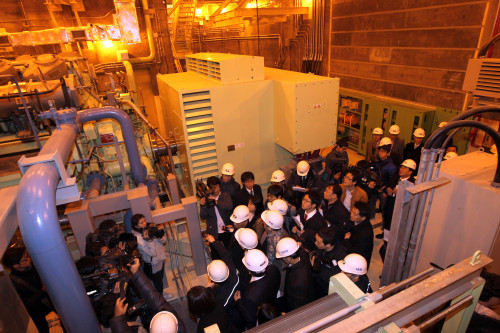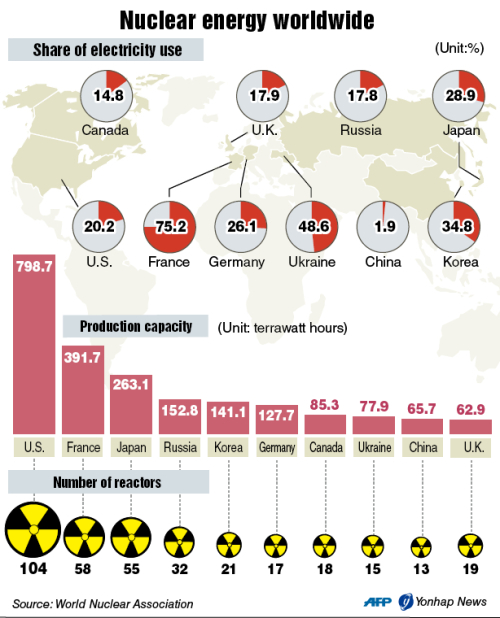Both threat, opportunity for Korean nuke sector...nity from Japan situation
By 고영아Published : March 16, 2011 - 19:11
Local builders focus on safety standards as Japan quake may dampen export markets
Renewed nuclear safety concerns arising from blasts and radiation leak in Japan will likely pose both a threat and an opportunity for the South Korean nuclear energy industry, experts said Wednesday.
The local nuclear industry may carry on the upbeat trend in Asian markets should it be able to prove its safety and technological excellence, but would face low demand from nuclear-skeptic European countries, they said.
Japan is fighting an uphill battle to avoid a meltdown after a radiation leak at a power station in Fukushima, north of Tokyo following the 9.0-magnitude temblor and subsequent tsunami.
The intensifying situation there is raising fears worldwide regarding safety atomic energy.
“The explosion at the Fukushima Daiichi reactor will have a major impact on long-term power generation plans globally,” said Malcolm Southwood, analyst at Goldman Sachs, adding that the incident may slow demand for atomic power across the world.
Korea, together with Japan, has been initiating a so-called “nuclear power renaissance,” making efforts to revive the global industry following the U.S. Three Mile Island accident and the Soviet Union’s Chernobyl disaster in 1986.
In regards to the country’s offshore nuclear business, Asia’s fourth-largest economy will be able to continue boosting its atomic facility exports in Asia should it prove its safety and outstanding technology, industry insiders said.
Asian nations such as China and Vietnam are said to be planning to push their plans to build dozens of new reactors.
The Chinese government said it will continue their atomic energy efforts to construct 77 new nuclear facilities despite a potential radiation disaster in Japan, according to authorities.
Vietnam also still has plans to put eight nuclear plants into operation over the next 20 years, the local government said.
Korea has been aiming to nurture its nuclear energy industry as a major growth driver in recent years, since the country won a $20 billion contract in 2009 to build four nuclear reactors in the United Arab Emirates by 2020.
The government set a goal in 2009 to export at least two nuclear reactors every year since the UAE deal and to foster 45,000 expert workforce in the industry by 2020. The country has not fetched any additional nuclear deals from overseas, loosing its competition in Vietnam and Turkey to Japan.
Though the strategy is based on the speculation that the number of nuclear reactors operating in the world will double from current 440, Minister of Knowledge Economy Choi Joong-kyung told reporters on Wednesday that the country will stick to the original target.
President Lee Myung-bak also stressed the safety of Korean-style nuclear facilities at the groundbreaking ceremony for the initial works for the planned Braka nuclear power plant during his visit to the Arab nation March 12-15.
Renewed nuclear safety concerns arising from blasts and radiation leak in Japan will likely pose both a threat and an opportunity for the South Korean nuclear energy industry, experts said Wednesday.
The local nuclear industry may carry on the upbeat trend in Asian markets should it be able to prove its safety and technological excellence, but would face low demand from nuclear-skeptic European countries, they said.
Japan is fighting an uphill battle to avoid a meltdown after a radiation leak at a power station in Fukushima, north of Tokyo following the 9.0-magnitude temblor and subsequent tsunami.
The intensifying situation there is raising fears worldwide regarding safety atomic energy.
“The explosion at the Fukushima Daiichi reactor will have a major impact on long-term power generation plans globally,” said Malcolm Southwood, analyst at Goldman Sachs, adding that the incident may slow demand for atomic power across the world.
Korea, together with Japan, has been initiating a so-called “nuclear power renaissance,” making efforts to revive the global industry following the U.S. Three Mile Island accident and the Soviet Union’s Chernobyl disaster in 1986.
In regards to the country’s offshore nuclear business, Asia’s fourth-largest economy will be able to continue boosting its atomic facility exports in Asia should it prove its safety and outstanding technology, industry insiders said.
Asian nations such as China and Vietnam are said to be planning to push their plans to build dozens of new reactors.
The Chinese government said it will continue their atomic energy efforts to construct 77 new nuclear facilities despite a potential radiation disaster in Japan, according to authorities.
Vietnam also still has plans to put eight nuclear plants into operation over the next 20 years, the local government said.
Korea has been aiming to nurture its nuclear energy industry as a major growth driver in recent years, since the country won a $20 billion contract in 2009 to build four nuclear reactors in the United Arab Emirates by 2020.
The government set a goal in 2009 to export at least two nuclear reactors every year since the UAE deal and to foster 45,000 expert workforce in the industry by 2020. The country has not fetched any additional nuclear deals from overseas, loosing its competition in Vietnam and Turkey to Japan.
Though the strategy is based on the speculation that the number of nuclear reactors operating in the world will double from current 440, Minister of Knowledge Economy Choi Joong-kyung told reporters on Wednesday that the country will stick to the original target.
President Lee Myung-bak also stressed the safety of Korean-style nuclear facilities at the groundbreaking ceremony for the initial works for the planned Braka nuclear power plant during his visit to the Arab nation March 12-15.

However, a major setback for Korea’s nuclear facility exports is expected to come from Europe, a region which has been refrained from fresh construction of atomic power plants in the past two decades.
Despite Europe’s need to reduce its dependence on conventional fuels such as oil, gas and coal, countries including Germany and Switzerland seem to be taking a cautious step.
German Chancellor Angela Merkel on Wednesday ordered the immediate closure of seven of the country’s 17 atomic power plants and called for a thorough review of the operating facilities.
Neighboring Switzerland has halted its plan to build and replace nuclear plants, and European Union is to execute a continent-wide stress test on whether their nuclear facilities are endurable to severe earthquakes.
Within the country, Seoul said it will improve safety and security at nuclear power plants.
“Reactors in South Korea are safer than those in Fukushima, being able to endure a 7.0 magnitude earthquake at most,” First Vice Minister of Knowledge Economy Ahn Hyun-ho told lawmakers in Seoul Wednesday. “Still, we will review and improve the safety of nuclear power plants.”
President Lee Myung-bak instructed his government Wednesday to painstakingly check the safety of local nuclear reactors, in a bid to ease public anxiety here amid news of Japan’s nuclear crisis, officials said.
Lee sent Minister of Education, Science and Technology Lee Ju-ho to a major nuclear power facility in the southeastern region of Gori for an on-site inspection, they added.

The country, which now operates 21 reactors nationwide, is planning to construct more nuclear reactors to reduce reliance on fossil fuels including crude and coal, and to diversify energy sources.
Korea, which currently depends on nuclear energy for 33 percent of its electricity, is to raise the figure to around 59 percent by 2030, according to the government.
Experts pointed out that regardless of the facilities’ safety and the low chance of Korea being hit by a quake or tsunami, the country has its unique risk in its relationship with North Korea.
“The North Korea variable can be even more critical for the local nuclear industry than a quake as our atomic plants can become a target of their attack,” they said.
Meanwhile, whereas panic spreads regarding the local nuclear industry, a contrasting trend is being shown for the renewable energy industries such as wind and photovoltaic power, analysts said.
Stocks for local firms involving in such businesses has risen considerably on Wednesday, despite the fluctuating benchmark KOSPI and KOSDAQ which was influenced by plunging Japanese index.
Industry experts are also for such a phenomenon, saying that Korea has to learn from Germany on how it reacted after the Chernobyl accident.
“After the Chernobyl disaster, Germany chose to step sway from nuclear energy refraining from constructing new plants and has been promoting the use of renewable energy, and energy efficiency and conservation instead.” Han Jae-gak, vice president of Center for Energy Politics said.
By Koh Young-aah (youngaah@heraldcorp.com)







![[Graphic News] More Koreans say they plan long-distance trips this year](http://res.heraldm.com/phpwas/restmb_idxmake.php?idx=644&simg=/content/image/2024/04/17/20240417050828_0.gif&u=)
![[KH Explains] Hyundai's full hybrid edge to pay off amid slow transition to pure EVs](http://res.heraldm.com/phpwas/restmb_idxmake.php?idx=644&simg=/content/image/2024/04/18/20240418050645_0.jpg&u=20240419100350)





![[From the Scene] Monks, Buddhists hail return of remains of Buddhas](http://res.heraldm.com/phpwas/restmb_idxmake.php?idx=652&simg=/content/image/2024/04/19/20240419050617_0.jpg&u=20240419175937)

![[KH Explains] Hyundai's full hybrid edge to pay off amid slow transition to pure EVs](http://res.heraldm.com/phpwas/restmb_idxmake.php?idx=652&simg=/content/image/2024/04/18/20240418050645_0.jpg&u=20240419100350)

![[Today’s K-pop] Illit drops debut single remix](http://res.heraldm.com/phpwas/restmb_idxmake.php?idx=642&simg=/content/image/2024/04/19/20240419050612_0.jpg&u=)